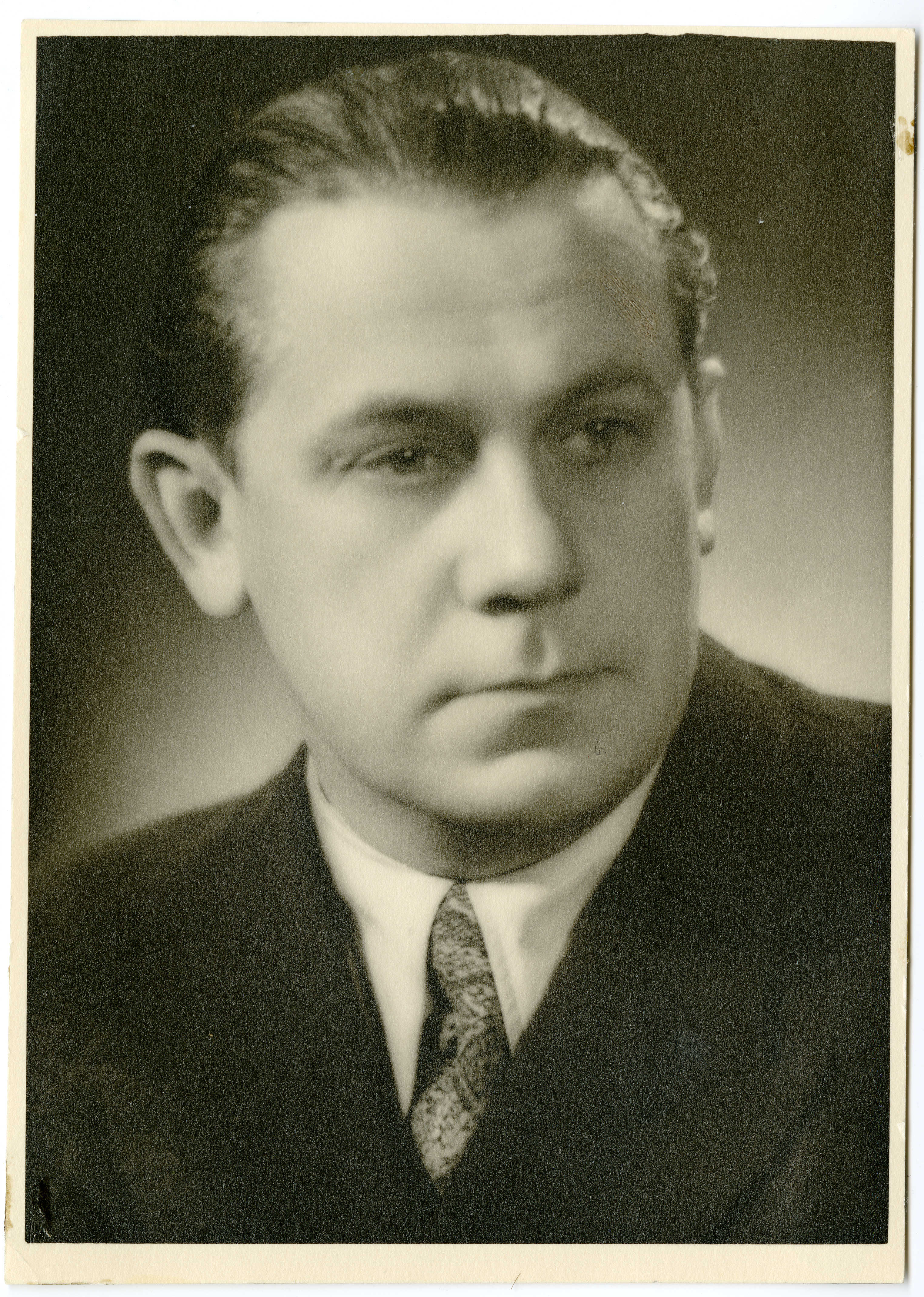
Osvald Tooming
Osvald Tooming (26./13. I 1914 – 6. VI 1992) was an Estonian prose writer and publicist, whose works, with their choice of everyday themes, was broadly based on the aesthetic principles of socialist realism. A central part in his works is played by ethical conflict, usually expressed in egotistical characters’ confrontation with a humane and naturalistic attitude to life.
Tooming was born into the family of a forest ranger in Läänemaa County, but he spent his childhood and schooldays in Western Virumaa. In 1931 he graduated from Tapa gymnasium and in 1935 began his studies in Tartu in the field of law; however he broke them off in 1939. From the end of secondary school Tooming’s work in various genres began at different publications in Tallinn and Rakvere. From 1940 he worked as executive secretary first at Rahva Hääl, later at Sirp ja Vasar. During the German occupation he was arrested and held until 1942 at the Central Prison in Tallinn. After his release he worked at the Ubja oil-shale mine as a warehouse clerk, and wrote some stories for journals. After the war he continued as executive secretary at the Rahva Hääl offices, and in 1947 he took up the same post with Looming. In that year he became a member of the Writers’ Union. During the Stalinist reprisals he was accused for collaboration with the German occupying power, since he had bene publishing his stories in newspapers at the time. Tooming was arrested and sent to a forestry camp in Kirov oblast, where he remained until 1955, when he was rehabilitated. Later he lived as a freelance writer at Haljala, Viljandi and Kolga-Jaani. He was an active member of the Hunters’ Association and the Society for the Protection of Nature.
Tooming’s most continuous literary activity began after the war, although six short stories of his had already been published. For the story Kaevandus elab (‘The Mine is Alive’, 1947), he won the Soviet Estonia prize. The novel Pruuni katku aastail (‘In the Years of the Brown Plague’) tells of prison life under the occupation; the novel Roheline kuld (‘Green Gold’) concentrates on the relationship between man and nature. The theme of human ethics, psychology and attitudes to life came to the fore in the stories Luigelend (‘Swan’s Flight’) and Õpetaja Hiiemägi (‘Hiiemägi the Teacher’), which Tooming wrote in labour camp, and in other works of the period. The panoramic novel Kaksteist aastat (‘Twelve Years’, 1963) immortalizes rural life in the years 1949-1961 through a family’s story. Likewise in his later works the treatment of rural and forest life is in the foreground. The compilation Puude taga on mets (‘There’s a Wood Behind the Trees’, 1972) collects together his appreciative writings on nature.
Tooming dramatized some prose classics (such as A. H. Tammsaare’s ‘The Misadventures of the New Satan’, and ‘Truth and Justice’, Aleksis Kivi’s ‘Seven Brothers’), but he also wrote plays himself. His first short plays, Tuled süttivad (‘The Fires Are Lit’, 1948) and Kükakünka kuningas (‘The King of Kükakünka’, 1949) were intended for amateur theatres. With the subsequent series of plays – Külvikuu (‘Sowing Month’, staged in 1972 at the Vanemuine Theatre), Musta Mandri kasupoeg (‘Foster-son of the Black Land’, staged in 1981 at the Vanemuine), and Rahva sõda (‘Civil War’, staged in 1981 at the Ugala theatre) – Tooming was contributing to the renewal of the Estonian theatre. The writer’s works for the theatre were often directed by his son Jaan Tooming. He also wrote scripts, such as for the films Salakütt (‘The Poacher’), Põrgupõhja uus Vanapagan (‘The Misadventures of the New Satan’), Mees ja mänd (‘The Man and the Pine-tree’). Films have been made based on Tooming’s story Õpetaja Hiiemägi and the novel Perekond Kirretid (‘The Kirret Family’); Veljo Tormis created an opera based on the story Luigelend.
I. S. (Translated by C. M.)
Books in Estonian
Novels
Roheline kuld. Tallinn: Eesti Riiklik Kirjastus, 1950, 410 lk. [2., muudetud trükk: 1957.]
Pruuni katku aastail. 1. osa: Ainus võimalus. Tallinn: Eesti Riiklik Kirjastus, 1950, 452 lk. [2. trükk: 1961.]
Perekond Kirretid. Tallinn: Eesti Riiklik Kirjastus, 1958, 250 lk. [2. trükk: 1974.]
Kaksteist aastat: ühe perekonna kroonika. Tallinn: Eesti Riikik Kirjastus, 1963, 440 lk.
Short stories and novellas
Uued inimesed: kolm jutustust. Tallinn: Eesti Riikik Kirjastus, 1948, 357 lk.
Kodumaa kutse. Tallinn: Eesti Riiklik Kirjastus, 1950, 272 lk.
Luigelend: kolm jutustust. Tallinn: Eesti Riikik Kirjastus, 1956, 398 lk.
Maantee läbi metsa: jutustus. Tallinn: Eesti Riiklik Kirjastus, 1960, 196 lk.
Kuus juttu. Tallinn: Eesti Raamat, 1966, 296 lk.
Metsade raamat. Tallinn: Eesti Raamat, 1969, 148 lk.
Luigelend. Õpetaja Hiiemägi. Perekond Kirretid. Tallinn: Eesti Raamat, 1974, 424 lk. [Jutustused ja romaan.]
Episoodid: jutustusi ja novelle. Tallinn: Eesti Raamat, 1976, 132 lk.
Üks maja, üks küla…. Tallinn: Eesti Raamat, 1986, 173 lk.
Seljasirutus. Argipäevad. Tallinn: Eesti Raamat, 1988, 204 lk.
Plays
Tuled süttivad: näidend 3 vaatuses 6 pildis. Tallinn: Ilukirjandus ja Kunst, 1948, 80 lk.
Kükakünka kuningas. Naljamäng 2-es vaatuses. Tallinn: Ilukirjandus ja Kunst, 1949, 72 lk.
Musta mandri kasupoeg. Rahva sõda, ehk Valge laev. Tallinn: Eesti Raamat 1988, 89 lk.
Non-fiction
Puude taga on mets. Tallinn: Eesti Raamat, 1975, 200 lk. [2., täiendatud trükk: 1983.]
Osvald Tooming, Peeter Tooming, Maantee kutsub = Highway Attracts. Kohtla-Järve: Ida-Viru Maavalitsus, 1993, 223 lk. [Sisaldab peamiselt O. Toominga poolt 1930. aastatel kirjutatud ajakirjanduslikke artikleid.]



